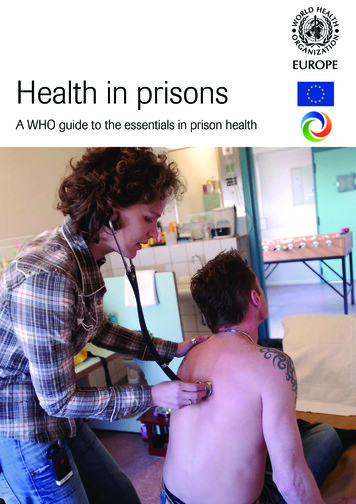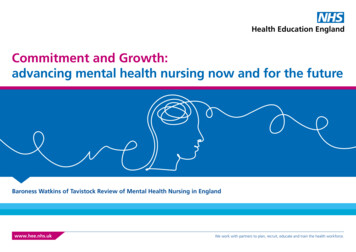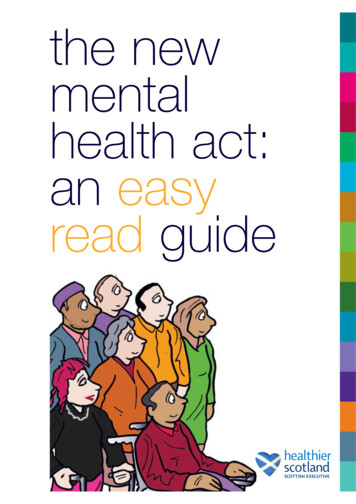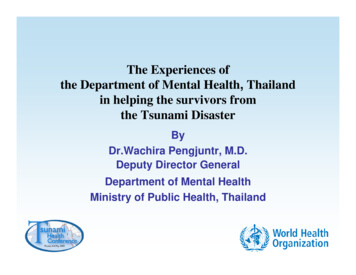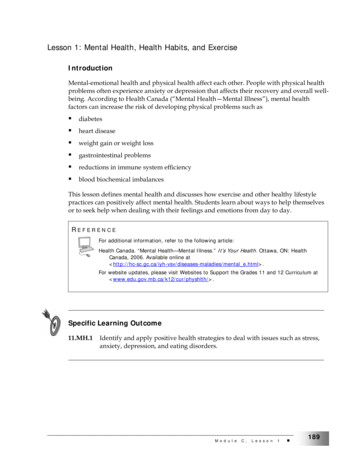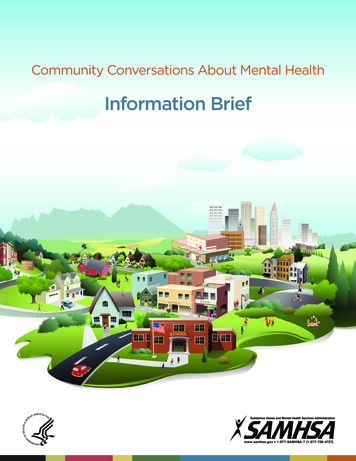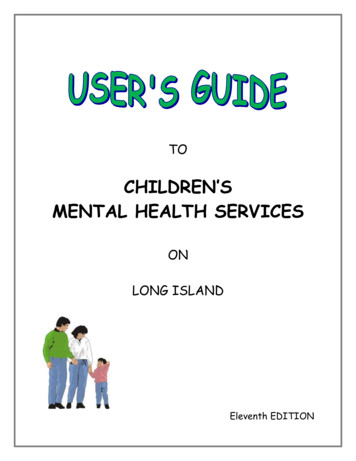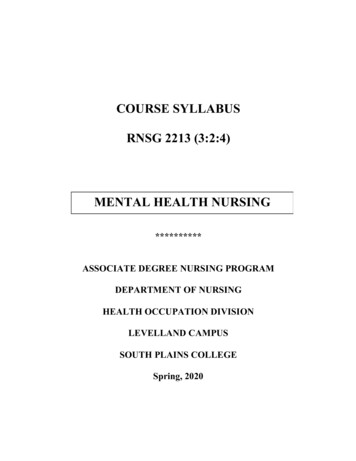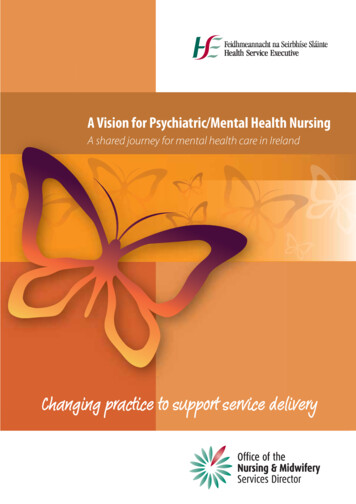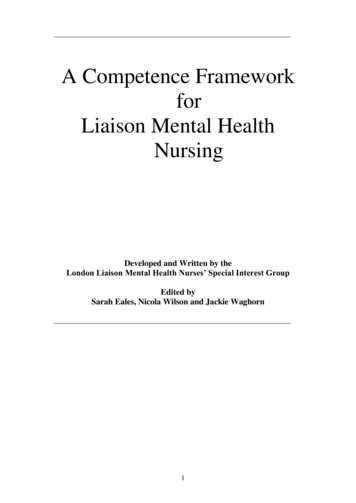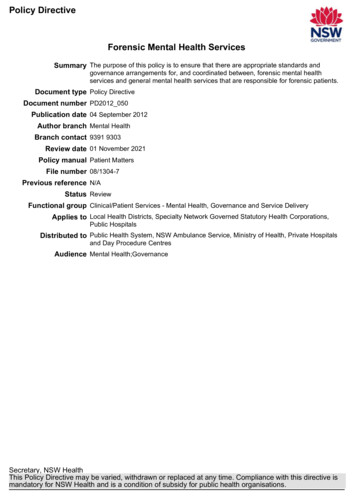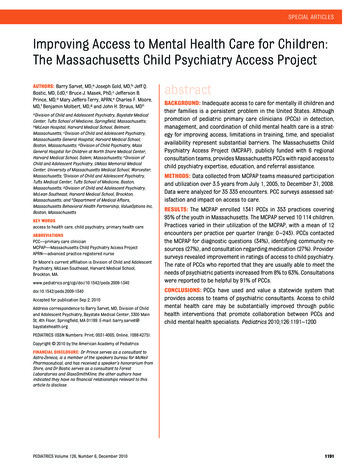
Transcription
SPECIAL ARTICLESImproving Access to Mental Health Care for Children:The Massachusetts Child Psychiatry Access ProjectAUTHORS: Barry Sarvet, MD,a Joseph Gold, MD,b Jeff Q.Bostic, MD, EdD,c Bruce J. Masek, PhD,c Jefferson B.Prince, MD,d Mary Jeffers-Terry, APRN,e Charles F. Moore,MD,f Benjamin Molbert, MD,g and John H. Straus, MDhaDivision of Child and Adolescent Psychiatry, Baystate MedicalCenter, Tufts School of Medicine, Springfield, Massachusetts;bMcLean Hospital, Harvard Medical School, Belmont,Massachusetts; cDivision of Child and Adolescent Psychiatry,Massachusetts General Hospital, Harvard Medical School,Boston, Massachusetts; dDivision of Child Psychiatry, MassGeneral Hospital for Children at North Shore Medical Center,Harvard Medical School, Salem, Massachusetts; eDivision ofChild and Adolescent Psychiatry, UMass Memorial MedicalCenter, University of Massachusetts Medical School, Worcester,Massachusetts; fDivision of Child and Adolescent Psychiatry,Tufts Medical Center, Tufts School of Medicine, Boston,Massachusetts; gDivision of Child and Adolescent Psychiatry,McLean Southeast, Harvard Medical School, Brockton,Massachusetts; and hDepartment of Medical Affairs,Massachusetts Behavioral Health Partnership, ValueOptions Inc,Boston, MassachusettsKEY WORDSaccess to health care, child psychiatry, primary health careABBREVIATIONSPCC—primary care clinicianMCPAP—Massachusetts Child Psychiatry Access ProjectAPRN—advanced practice registered nurseDr Moore’s current affiliation is Division of Child and AdolescentPsychiatry, McLean Southeast, Harvard Medical School,Brockton, 40doi:10.1542/peds.2009-1340Accepted for publication Sep 2, 2010Address correspondence to Barry Sarvet, MD, Division of Childand Adolescent Psychiatry, Baystate Medical Center, 3300 MainSt, 4th Floor, Springfield, MA 01199. E-mail: barry.sarvet@baystatehealth.orgabstractBACKGROUND: Inadequate access to care for mentally ill children andtheir families is a persistent problem in the United States. Althoughpromotion of pediatric primary care clinicians (PCCs) in detection,management, and coordination of child mental health care is a strategy for improving access, limitations in training, time, and specialistavailability represent substantial barriers. The Massachusetts ChildPsychiatry Access Project (MCPAP), publicly funded with 6 regionalconsultation teams, provides Massachusetts PCCs with rapid access tochild psychiatry expertise, education, and referral assistance.METHODS: Data collected from MCPAP teams measured participationand utilization over 3.5 years from July 1, 2005, to December 31, 2008.Data were analyzed for 35 335 encounters. PCC surveys assessed satisfaction and impact on access to care.RESULTS: The MCPAP enrolled 1341 PCCs in 353 practices covering95% of the youth in Massachusetts. The MCPAP served 10 114 children.Practices varied in their utilization of the MCPAP, with a mean of 12encounters per practice per quarter (range: 0 –245). PCCs contactedthe MCPAP for diagnostic questions (34%), identifying community resources (27%), and consultation regarding medication (27%). Providersurveys revealed improvement in ratings of access to child psychiatry.The rate of PCCs who reported that they are usually able to meet theneeds of psychiatric patients increased from 8% to 63%. Consultationswere reported to be helpful by 91% of PCCs.CONCLUSIONS: PCCs have used and value a statewide system thatprovides access to teams of psychiatric consultants. Access to childmental health care may be substantially improved through publichealth interventions that promote collaboration between PCCs andchild mental health specialists. Pediatrics 2010;126:1191–1200PEDIATRICS (ISSN Numbers: Print, 0031-4005; Online, 1098-4275).Copyright 2010 by the American Academy of PediatricsFINANCIAL DISCLOSURE: Dr Prince serves as a consultant toAstra-Zeneca, is a member of the speakers bureau for McNeilPharmaceutical, and has received a speaker’s honorarium fromShire, and Dr Bostic serves as a consultant to ForestLaboratories and GlaxoSmithKline; the other authors haveindicated they have no financial relationships relevant to thisarticle to disclose.PEDIATRICS Volume 126, Number 6, December 20101191
Access to mental health care for children has been a significant problemfor children and families in the UnitedStates.1,2 As a result, the majority ofchildren with mental health conditionssevere enough to impair their functioning are not receiving any treatment.3– 6 Given the high prevalence ofpsychiatric illnesses among childrenand adolescents, it has become clearthat the workforce of specialists inchild and adolescent psychiatry is notlarge enough, by itself, to meet theneeds of these children.7 Consequently, there is a growing realizationthat improving access to children’smental health care will require the development of new system-based practice models that emphasize collaboration among health care providers.8–10Pediatric primary care providers areeminently suited to play a critical rolein responding to the mental healthneeds of children.11–13 Mental health issues present in the pediatric primarycare setting at a high frequency, oftenwell before any contact with the specialty mental health system.14 Becauseof their longitudinal, trusting relationships with children and families, primary care clinicians (PCCs) are wellpositioned to recognize deviations inchildren’s social and emotional development and to identify mental healthneeds before they cause significantmorbidity.15 It is unfortunate that, withminimal child psychiatry training provided during general pediatrics residency in combination with limitedavailability of child psychiatry specialists to whom to refer, PCCs often feelunable to adequately manage children’s mental health problems.16,17The results of several previous studieshave demonstrated the feasibility andvalue of systematic models of collaboration between child and adolescentpsychiatrists and pediatricians withinspecific practice settings for improving access to children’s mental1192SARVET et alhealth care.18–21 However, large-scale,population-based implementation ofa contemporary child psychiatry/primary care collaboration model hasnot previously been described.the PCC, (3) assistance in coordinatingcare for children who need variouscommunity mental health services,and (4) continuing professional education regarding children’s mentalhealth designed specifically for PCCs.THE MASSACHUSETTS CHILDPSYCHIATRY ACCESS PROJECTThe central planning, administration,and coordination of the program wasprovided by a managed behavioralhealth organization (MassachusettsBehavioral Health Partnership, a subsidiary of ValueOptions) under contract with Massachusetts for statewide public-sector mental healthinitiatives, including the Medicaid program. The MCPAP serves all childrenand adolescents in the state regardless of the child’s or family’s insurancestatus.In June 2005, the Massachusetts statebudget included funding for the Massachusetts Child Psychiatry AccessProject (MCPAP). The political will andfunding for the project was the resultof long-term advocacy work by severalbroad-based coalitions of professionaland consumer stakeholders workingwith public policy makers committedto finding solutions for urgent concerns regarding inadequate access tocare. Modeled after a promising pilotstudy at the University of Massachusetts22 and other previously describedlocalized collaborative models, the aimof the MCPAP was to bring a system forchild psychiatry/primary care collaboration to scale across the entire stateof Massachusetts. The overarchinggoal of the project was to improve access to care for children with mentalhealth problems through (1) promoting and supporting the role of the PCCas a legitimate, front-line mentalhealth provider for children and (2)bridging the large gaps between mental health systems and primary caresystems, which impede access to mental health services.The state was divided into 6 regions,and MCPAP teams were created withinacademic medical centers for each ofthese regions. The MCPAP teams weretasked with providing collaborativesupport to all PCCs of their respectiveregions by implementing a system forthe PCCs to obtain (1) immediate informal telephonic consultation regardingthe mental health needs of any child inthe primary care setting, (2) timely, asneeded provision of formal outpatientconsultation for children referred byMETHODSMCPAP OperationsStaffingEach of the 6 regional MCPAP teams ishosted by a division of child psychiatrywithin a regional academic medicalcenter and composed of 1 full-timeequivalent (FTE) child psychiatrist, 1FTE licensed child and family psychotherapist, and 1 FTE care coordinator.Several of the teams include a specialized advanced practice registerednurse (APRN) who works, under supervision, in a role similar to that of thechild psychiatrists. The child psychiatrist FTE is usually shared by a group of3 to 5 faculty members who each contributes a portion of his or her time forperforming consultations and fieldingtelephone calls from enrolled PCCs.The group of child psychiatrists provides on-call coverage for PCCs duringusual business hours, Monday throughFriday. The psychotherapist and carecoordinator are usually full-time employees on their respective teams.Recruitment/Enrollment of PCCsBefore any provision of service, theMCPAP teams established formal rela-
SPECIAL ARTICLEStionships with primary care practices.Teams were provided lists from bothMedicaid and commercial insurancedirectories of all primary care practices serving children and adolescentsin their regions. PCCs included pediatricians, family practice physicians,and nurse practitioners. To make MCPAP services universally accessible toall children and adolescents acrossMassachusetts, teams arranged onsite orientation meetings for all practices in their region. At these meetings,PCCs met members of the MCPAPteam, participated in collegial discussion regarding mental health needs ofpatients within their practices, and received an introduction and orientationto the program. Most importantly,teams negotiated mutual expectationswith PCCs of the practice. For example,although the MCPAP promises to provide assistance and support for therole of the PCC in responding to mentalhealth needs of children, PCCs are expected to maintain involvement in thepatient’s mental health follow-up to adegree appropriate to the complexityof the patient’s issues. Orientationmeetings concluded with the establishment of an agreement to participate in the program and subsequentcompletion of an enrollment documentby the lead physician of the practice.Core MCPAP ServicesTelephone ResponseTelephone communication is central to the MCPAP clinical process (Fig1). Enrolled PCCs access the staff oftheir regional MCPAP team through ahotline, which is answered directly bythe care coordinator. The care coordinator personally handles calls to request help in finding community mental health services for children.Otherwise, he or she routes the call fortelephone consultation to the appropriate member of the team after identifying the type of PCC question. Clinicalquestions may be routed to either theavailable child psychiatrist or the teampsychotherapist. The call is exclusivelyrouted to the child psychiatrist if thePCC identifies a need for discussion ofpsychiatric medication or differentialdiagnosis. Other types of clinical questions regarding family functioning, behavior management, crisis management, and/or treatment planning arerouted to either the MCPAP child psychiatrist or the psychotherapist according to PCC preference and/or theimmediate availability of the teammember. The telephone consultation isintended to be provided while the patient is still in the PCC’s office so thatrecommendations can be communicated and implemented efficiently. TheMCPAP telephone consultant may recommend additional mental health services such as referrals for outpatienttherapy, specialized child psychiatryfollow-up, crisis services, and/or acuteinpatient treatment. In these instances, assistance from the MCPAPcare coordinator is offered for implementation of these referrals. Inaddition to providing “curbside” answers to clinical questions, the telephone consultations also serve a tri-FIGURE 1MCPAP clinical process algorithm.PEDIATRICS Volume 126, Number 6, December 20101193
age function for the direct face-toface consultations provided by theMCPAP team.Outpatient (Face-to-Face)ConsultationMCPAP clinicians, including childpsychiatrists, psychotherapists, andAPRNs, provide outpatient consultations when telephone consultationsare not sufficient for answering theclinical question of the PCC. Outpatientconsultations are scheduled as soonas possible, generally within 2 weeks.The MCPAP care coordinators keepPCCs informed about their efforts toschedule these consultations. Conciseconsultation letters that include detailed recommendations are transmitted to PCCs within 48 hours of theappointment.Coordinating CareAcknowledging the practical and logistic needs of PCCs surrounding theprovision of mental health care, assistance with identification, referral, andcoordination of mental health servicesis provided by all MCPAP team members. This assistance may be providedin the form of advice to the PCC duringtelephone consultations regarding selection of resources, intake procedures, securing insurance authorization, and various idiosyncratic accessrequirements of mental health programs. When needed, the service of theMCPAP care coordinator is offered directly to families to help them secureappointments for services that are difficult to access. The care coordinatorbecomes an expert at finding clinicalresources for families by maintainingclose working relationships with intake coordinators at community mental health agencies and keeping updated information regarding waitingtimes and availability of clinicians forspecial clinical populations in the localcommunities within that region. MCPAP clinicians may internally refer patients for an outreach call by the care1194SARVET et alcoordinator at the conclusion of a telephone consult or outpatient consultation. An MCPAP psychotherapist mayprovide interim outpatient psychotherapy if the waiting time for a recommended clinical resource in the community is unacceptably long (Fig 1).Continuing EducationAll consultative communicationsare intended to function as individualized, case-based education for PCCs.MCPAP clinicians are encouraged to include discussion of topics such as relevant research, best-practice guidelines, and interviewing/assessmentmethods in telephone consultations.Web-based educational resources provided by the MCPAP included a blog onwhich consultants and staff postedbrief articles and news alerts regarding topics related to children’s mentalhealth in primary care. More recently,the blog was replaced with a morecomprehensive public Web site entitled “MCPAP: Connecting Primary CareWith Child Psychiatry.”23 This siteserves as an educational resource forPCCs regarding children’s mentalhealth in primary care and providesoriginal content and links to vettedsources of clinical information, practice guidelines, patient and familyhandouts, and clinical rating scales. Inaddition, MCPAP teams organize largeregional conferences that deliver continuing education programming onchildren’s mental health in primarycare.FundingEach medical center is fully reimbursed for the direct and indirect operational expenses of its team throughcontracts with the program. The teammembers are employed by their respective medical centers and are ableto have “protected time” to devote tothe operation of the program. The costof the program, including administrative expenses, is 2 per child/adoles-cent per year ( 0.16 per member permonth) or 3 million for the 1.5 millionchildren in Massachusetts.Data CollectionMCPAP EncountersEach discrete service performed by amember of the MCPAP team (includingall of the activities represented in Fig1) is considered an “encounter” and islogged into a secure, Health InsurancePortability and Accountability Act(HIPAA)– compliant structured-querylanguage online database system. Client applications communicate with acentral server via a virtual private network (VPN) tunnel. MCPAP providersenter the data from each encounter oneither a desktop computer or personaldigital assistant (PDA). Data for statistical analysis are transmitted securelyto the central server with identifyinginformation accessible only to themembers of the originating MCPAPteam.PCC Satisfaction With the MCPAPTo monitor PCC satisfaction, a briefbaseline and follow-up PCC survey instrument that measures perception ofaccess to care, ability to meet theneeds of patients with mental healthproblems, timeliness of access to achild psychiatrist, and satisfactionwith MCPAP consultative services issent to all enrolled providers. PCCs areasked to complete the baseline questionnaire on enrollment. Follow-upquestionnaires are mailed annually.Approximately 1 month after follow-upquestions are mailed, a reminder callis placed by an MCPAP care coordinator to the PCC office manager to encourage completion and return of thesurveys. Follow-up questionnaires donot contain personal information butare labeled with a tracking number toassociate the data with the baselineassessment.
SPECIAL ARTICLESBehavioral health screening toolmandate: December 31, 200720001800160014001200All 6 regions upand running10008006004002000FIGURE 2Number of MCPAP encounters according to month, all regions.RESULTSEncounter DataMCPAP utilization as measured by encounter volumes has increased significantly since the inception of the program in 2005 (Fig 2; Table 1). By the endof 2008, 353 practices including 1341PCCs were oriented and voluntarily enrolled to participate in the program.The combined panel size for thesepractices was estimated to be 1.36 million children and adolescents, whichrepresented 95% of the child/adolescent population of Massachusetts.24The total number of encounters according to services provided and provider type from July 1, 2005, throughDecember 31, 2008, are listed in Table2. The majority of telephone consultations were provided by the child psychiatrist (45%), which indicates PCCs’high level of demand for discussionwith a physician. The face-to-face consultations were equally provided byMCPAP child psychiatrists (2517 encounters) and psychotherapists (2537encounters). The relatively low frequency of interim psychotherapy encounters (1294 of 33 335 [2.4% of thetotal]) suggests that interim psychotherapy was not needed or that psychotherapeutic referrals were accomplished in the community outside ofthe MCPAP system. MCPAP interim psychotherapy was provided for 243 pa-tients for an average of 4.1 sessionsper patient. The reasons why PCCs initially telephoned MCPAP team members are listed in Table 3 (data collected from April 1, 2008, to December31, 2008). The 3 major reasons werediagnostic assistance (34%), information about resources in the community(27%), and medication questions(27%).Telephone consultations culminated inthe negotiation of a plan for the patient’s subsequent care. Outcomes ofthese negotiations for all of the initialtelephone encounters during the studyperiod are summarized in Table 4. In28% of these encounters, the decisionTABLE 1 MCPAP PCC Enrollment and Utilization DataTime PeriodQ1, FY 2008 (7/1/2007–9/30/2007)Q2, FY 2008 (10/1/2007–12/31/2007)Q3, FY 2008 (1/1/2008–3/31/2008)Q4, FY 2008 (4/1/2008–6/30/2008)Q1, FY 2009 (7/1/2008–9/30/2008)Q2, FY 2009 (10/1/2008–12/31/2008)Cumulative No. ofNo. of MCPAP Encountersa Per No. of PCCs % of Enrolled PracticesMaximum No. ofMCPAP-Enrolled Practices Encountersa Enrolled Practice EnrolledThat Used the MCPAP Encountersa Per 200209215214245Q indicates quarter; FY, fiscal year.a Includes encounters for all activities including telephone, face-to-face, and care coordination.PEDIATRICS Volume 126, Number 6, December 20101195
TABLE 2 Encounters According to Services Provided and Provider Type From July 1, 2005, to December 31, 2008 (Encounters, N 35 335; Patients, N 10 114)Provider TypeNo. ofEncountersTelephoneConsult EncountersFace-to-FaceEncountersCare-Coordination EncountersWith ProvidersaCare-CoordinationEncounters With FamiliesOtherPsychotherapistChild psychiatristCare coordinatorAPRNGrand total13 28811 1696173470535 335369363701236287414 6935276068568072942563abMay include assistance with early intervention, special education, partial hospitalization, short-term residential programs, and referrals to local behavioral health resources.Of the encounters, 1243 were face-to-face without therapy; 1294 encounters included interim therapy.TABLE 3 Reason for Initial TelephoneEncounters From PCCs to the MCPAPTeam From April 1, 2008, toDecember 31, 2008 (Initial TelephoneEncounters, N 3497)Reason for InitialTelephone tion questionsAdvice for parentsSecond opinionaSchool issuesCrisisOtherbNon–member-relatedcNo. of% of TotalInitialInitialTelephone 2210aPCC raises question or concern about care provided by acommunity mental health provider.b Miscellaneous clinical question regarding assessmentor treatment of a specific patient.c General question regarding mental health topic, notlinked to a specific patient.TABLE 4 Outcomes of Initial TelephoneEncounters From July 1, 2005, toDecember 31, 2008 (Initial TelephoneEncounters, N 8223)Outcomen%Outpatient consultation by theMCPAP’s child psychiatrist orAPRNContinue PCC managementCare coordination with family bythe MCPAPOutpatient consultation by theMCPAP’s psychotherapistRefer to a child psychiatrist outin the communityRefer child back to an existingpsychiatristaRefer to a community psychiatriccrisis serviceAdvice about non–patient-relatedissuesRefer to psychiatric Includes questions regarding patients who were alreadyseeing a child psychiatrist in the community.1196SARVET et alwas made for the child to receive aface-to-face consultation by the MCPAPchild psychiatrist or APRN. For 15%, theMCPAP psychotherapist provided anoutpatient consultation. Almost onefourth (24%) of these initial telephoneencounters resulted in the PCC maintaining primary clinical responsibilityfor the mental health problem. A separate analysis (not presented here) indicated that PCCs agreed to continueto follow 50% of the patients after theinitial MCPAP team member encounter. The 92 initial telephone encountersfor dangerously troubled children whorequired hospitalization or immediatecrisis services represented a relatively small percentage of the total.The diagnoses made by MCPAP teammembers after telephone encountersare summarized in Table 5. Althoughattention-deficit/hyperactivity disorder, depressive disorder, and anxietydisorders were the most frequent diagnoses (32%, 24%, and 23% of encounters, respectively), there was awide range of psychiatric diagnosesincluding complex disorders such asbipolar disorder (5%) and psychosis(1%). Encounters in which substanceabuse was discussed were relativelyinfrequent (2%). Results of additionalanalysis indicate that 40% of the patients had more than 1 psychiatric diagnosis, and 17% of the patients werereceiving more than 1 psychiatricmedication. The outcomes of telephone consultations for the 3 mostcommon diagnoses (attention-deficit/hyperactivity disorder, depression,TABLE 5 Patient Diagnoses Made byTelephone Consultation EncountersFrom July 1, 2005, to December 31,2008 (N 14 orderDepressionAnxietyOther psychiatric diagnosisOppositional defiant disorderDiagnosis deferred (until furtherinformation is obtained)BipolarPervasive developmentaldisorderAdjustment disorderPosttraumatic stress disorderObsessive compulsive disorderEating disorderSubstance abuseMood disorder not otherwisespecifiedPsychosisDevelopmental disabilityConduct disorderCo-occurring medical conditionNot applicable, no 5573451371283252204433221155147115723311110More than 1 diagnosis per encounter may exist.and anxiety disorders) mirrored theoutcomes of all mental health diagnoses, as depicted in Table 4. Crisisevaluations, although uncommon,were a more frequent outcome fortelephone consultations regarding patients with depression (2% [31 of1915]) than for patients with eitheranxiety (1% [13 of 1709]) or attentiondeficit/hyperactivity disorder (0.4%[10 of 2300]).In addition to the educational contentof telephone consultations, MCPAPteam members organized 8 major continuing medical education full- or half-
SPECIAL ARTICLESday conferences on topics related tochild psychiatry in primary care overthe 3.5-year study period. Furthermore, there were 702 educational encounters during the study period thatrepresented discussions with PCCs either at their practice sites or over thetelephone regarding child psychiatrytopics. A recently developed MCPAP educational Web site23 has 51 of pages ofcontent and has received an averageof 5573 page views per month fromJuly 1, 2009, through January 31, 2010.Eighty posts have been made to the online blog.PCC Satisfaction DataOf the 1341 enrolled PCCs, baselinesurveys were returned by 514 (38%).Of these 514 PCCs, a total of 385 (75%)completed follow-up surveys in 2008and/or 2009. More than 90% of the respondents in both 2008 and 2009agreed or strongly agreed that MCPAPconsultations were useful. Responsesfrom follow-up surveys in 2008 (n 244) and 2009 (n 298) were compared with responses from the 385baseline surveys (Table 6; Fig 3). Asshown in Table 6, the percentage ofPCCs who agreed or strongly agreedthat there was adequate access to achild psychiatrist increased from 5%to 33%. Similarly, the percentage ofPCCs who agreed or strongly agreedthat they were able to meet the needsof children with psychiatric problemsincreased from 8% to 63%, and thepercentage of those who were able toobtain a child psychiatry consultationin a timely manner increased from 8%to 80%.DISCUSSIONAfter 3.5 years of operation, a high percentage of PCCs in Massachusettshave voluntarily enrolled in the MCPAP,and 90% of those who returned afollow-up survey reported positive satisfaction. Overall utilization of the MCPAP services has been robust, and aPEDIATRICS Volume 126, Number 6, December 2010TABLE 6 PCC Satisfaction Survey Results for All Regions That Have Used MCPAP Services, FiscalYear 2008 (N 244) and Fiscal Year 2009 (N 298)Baseline,%I find the MCPAP consults to be usefulStrongly disagreeDisagreeNo opinionAgreeStrongly agreeAdequate access to child psychiatry for mypatientsStrongly disagreeDisagreeNo opinionAgreeStrongly agreeWith existing resources I am usually able tomeet the needs of children withpsychiatric problemsStrongly disagreeDisagreeNo opinionAgreeStrongly agreeI am able to consult with a childpsychiatrist in a timely mannerStrongly disagreeDisagreeNo opinionAgreeStrongly agreePost-MCPAPFY 2008, %Post-MCPAPFY 2009, 89425953104542671267483731445327FY 2008, July 1, 2007, to June 30, 2008; FY 2009, July 1, 2008, to June 30, 2009. FY indicates fiscal year.majority of enrolled PCCs used the program each quarter. However, therewas substantial variation in theamount of utilization among specificprimary care practices. PCC agreement to provide follow-up psychiatriccare for 50% of the patients involved inMCPAP encounters indicates a reasonable degree of confidence in the PCCs’ability to manage psychiatric problems within the collaborative relationships created by the MCPAP. It is presumed, although not proven in thisstudy, that a significant proportion ofthese patients were cared for by theparticipating PCCs and did not requirereferral for psychiatric care in thecommunity. The PCCs’ willingness toassume mental health care for thesepatients (without referring them to thelimited child and adolescent psychiatrists) helps free up time for specialists to work with patients who have themost complex and severe conditionswhile providing a cost-effective alternative for a subset of patients with relatively uncomplicated mental healthproblems.STUDY LIMITATIONS AND FUTUREDIRECTIONSThere are several limitations to thisstudy. Most concerning is the reliability of the data regarding provider satisfaction. It is unclear whether the positive effects and benefits of the MCPAPcould be skewed by reliance on thesurveys submitted. Although effortswere made to include all enrolledPCCs, not all PCCs returned the surveys, so the results may reflect moreresponses from those who found valuein the MCPAP. Similarly, in a more fragile mental health climate, in the context of widespread concern about limitations in children’s mental health1197
Mean response (1, strongly disagree; 5, strongly agree)54Adequate access to childpsychiatry for my patientsUsually able to meet needsof children with psychiatricproblemsAble to receive childpsychiatry consult in timelymanner321Bas elineFY 2008FY 2009MCPAP satistaction surveyFIGURE 3Mean MCPAP PCC satisfaction survey responses (N 385 at baseline). FY indicates fiscal year.resources, PCCs may be more inclinedto provide positive responses to preserve MCPAP support during this time.Another limitation was the lack ofmeaningful comparisons among sites.Specifically, stylistic differences in themanagement of collaborative relationships with PCCs across sites may affect PCC utilization and satisfaction; inaddition, rural versus urban utilizationmay vary and reveal important needsand priorities when new MCPAP programs are initiated, which remains animportant focus f
Boston, Massachusetts; dDivision of Child Psychiatry, Mass General Hospital for Children at North Shore Medical Center, Harvard Medical School, Salem, Massachusetts; . minimal child psychiatry training pro-vided during general pediatrics resi-dency in combination with limited availability of child psychiatry special-ists to whom to refer .

